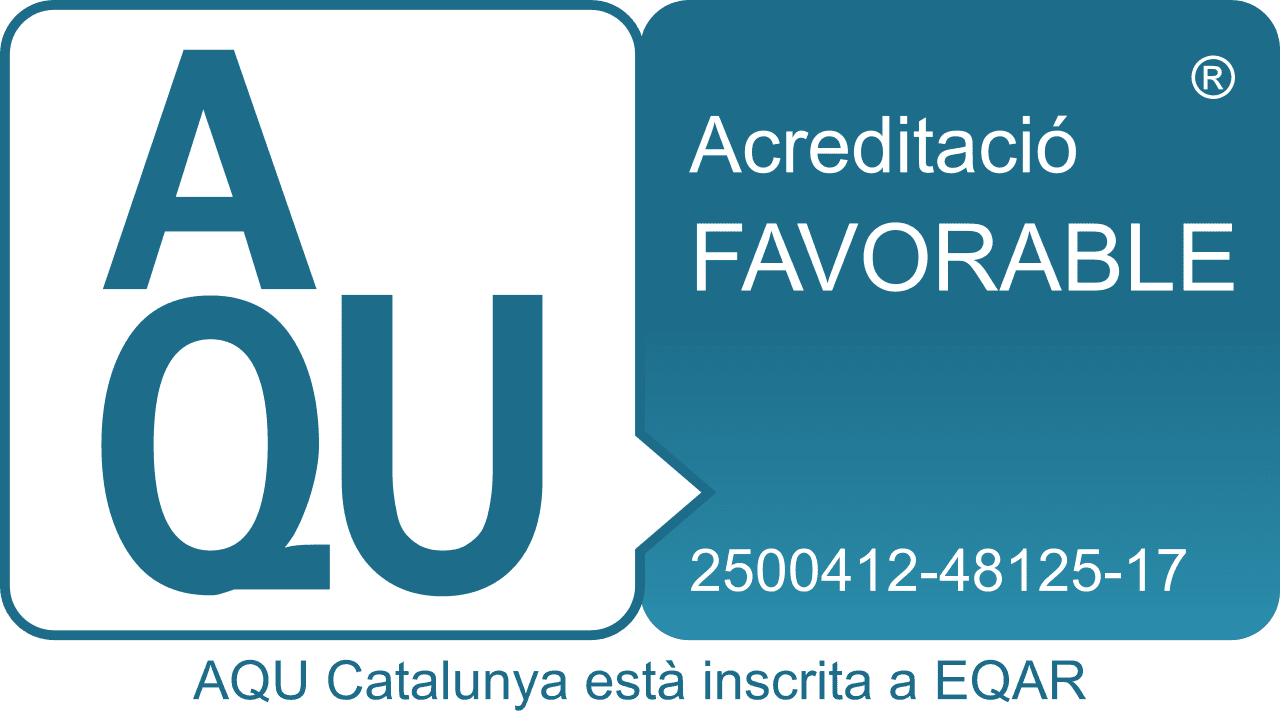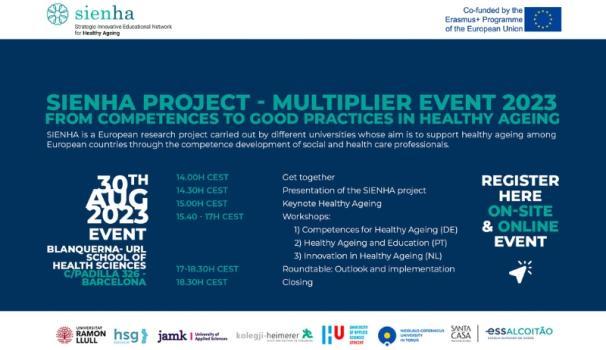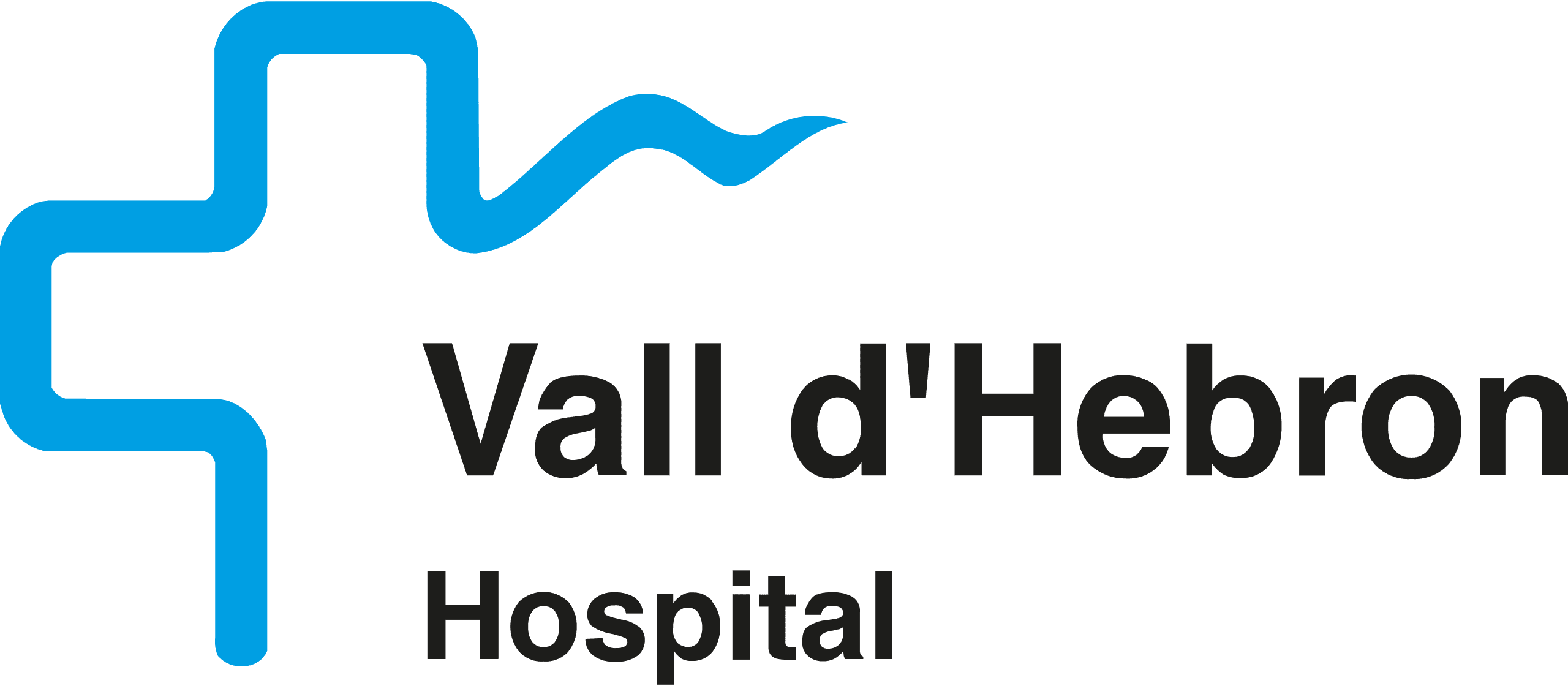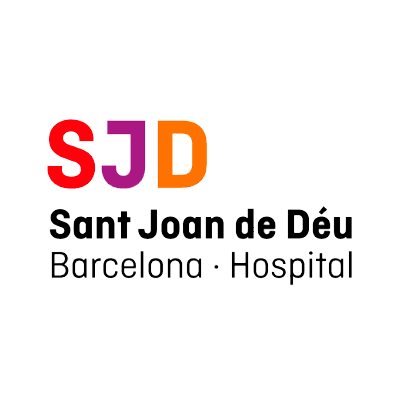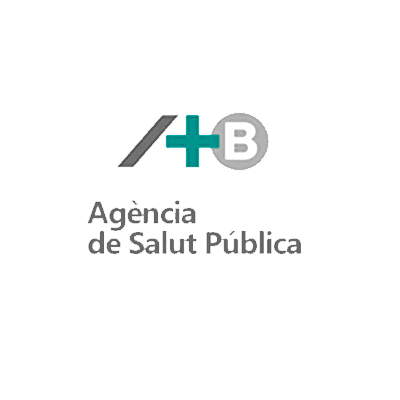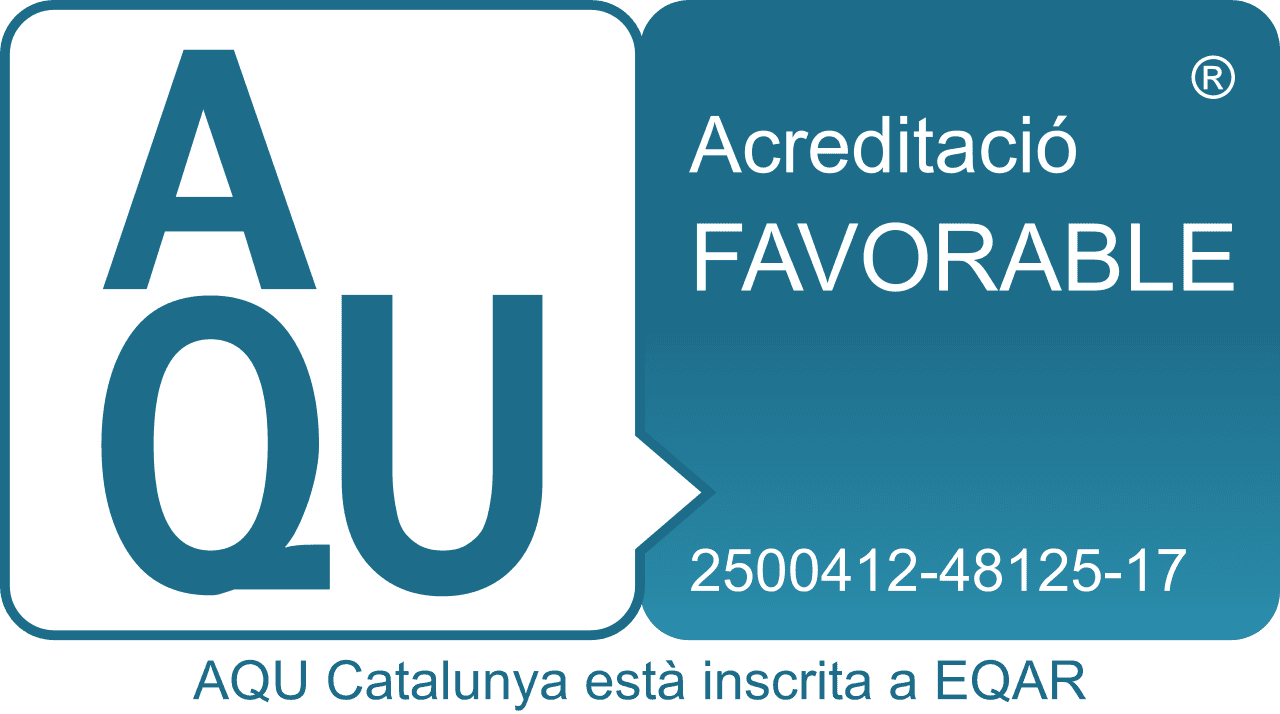- Home/
- Bachelor's Degree in Human Nutrition and Dietetics
Bachelor's Degree in Human Nutrition and Dietetics
Enrolment open

- ModalityIn-person
- LanguagesCatalan, Spanish
- Duration4 academic years
- Credits240
- DateSeptember 2026
- Planning
First-, and second-year students: From 8 a.m. to 2 p.m.
Third-, and fourth-year students: From 3 p.m. to 8 p.m.
- Places60
- Location
Blanquerna-URL - Carrer Padilla, 326-332. 08025 Barcelona
- Faculty
Blanquerna School of Health Sciences
Who is the course aimed at?
All those who like to gain in-depth knowledge of the composition of food, the human body, the reactions and metabolic processes that take place, identify why we eat what we eat and know how to handle and cook food to ensure optimal hygiene and food safety guidelines. To learn how to plan healthy, sustainable and adapted dietary proposals for people who are healthy or ill, in order to ensure individual and community health and foster an optimal standard of living.
Great scope for professional growth
Public and community health to work with public and private entities, NGOs, etc. in order to foster health and prevent diseases
Mass catering, whether social or commercial, to ensure service quality from a hygiene and food safety, nutritional, organoleptic and economical viewpoint
Food industry, whether in marketing and communication, R&D or research
If you choose the bachelor's degree in Human Nutrition and Dietetics at Blanquerna, you choose…
A bachelor's degree designed in order to train professionals committed to the well-being of others on a daily basis
- Training by sharing the professional experiences of active faculty and experts in the subject taught.
- Compulsory external internships in three different fields (clinical, community and mass catering) that will enable you to contact potential future employers. You will also have the possibility of doing international internships in benchmark universities.
- Seminars where you will work on cases and situations in groups of around ten students, with the guidance and accompaniment of an advisor.
- Potential job placement in places where external internships are conducted.
- Innovative teaching methodologies and professional scenario simulations.
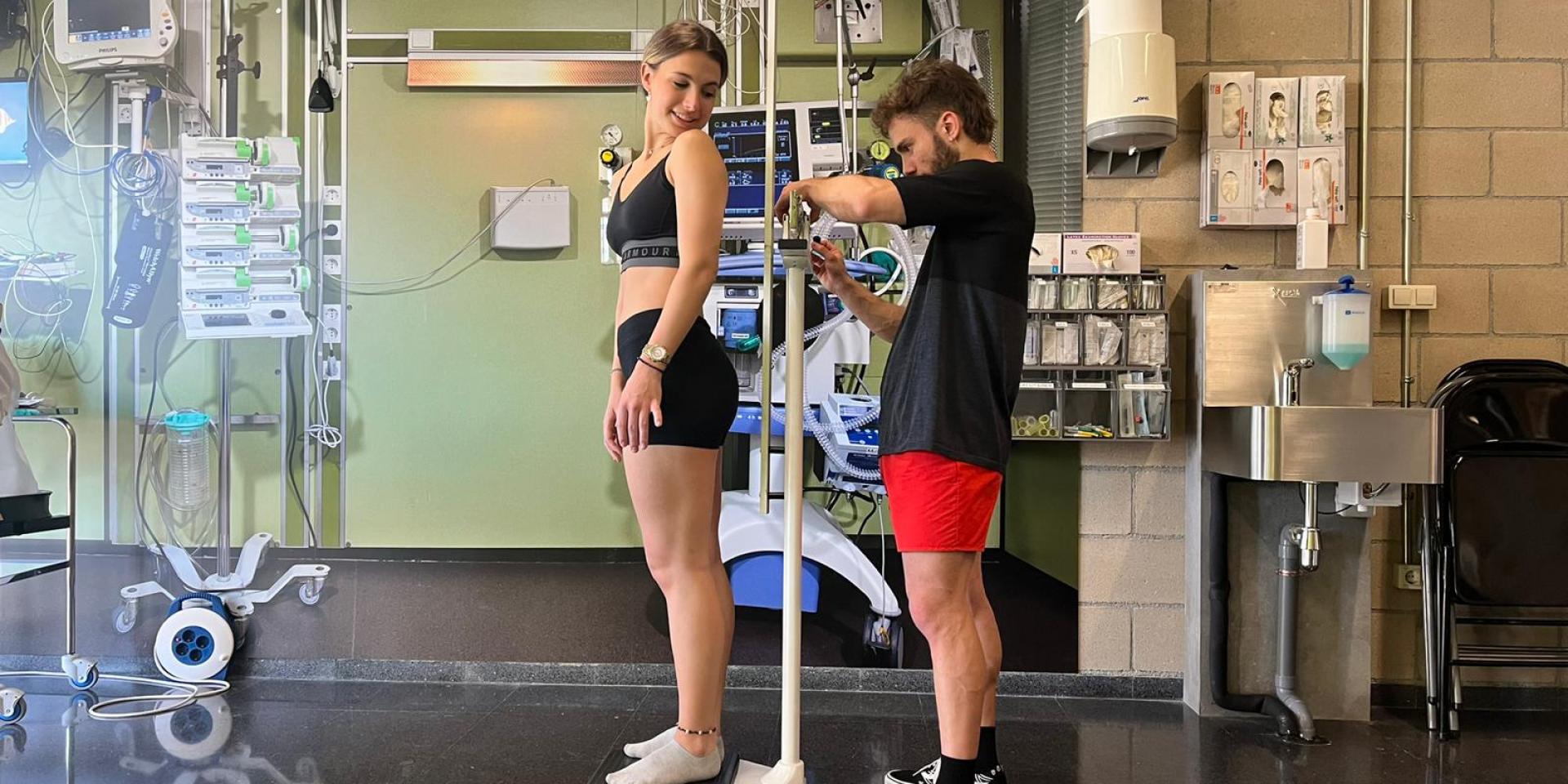
You will experience the passion for your future profession learning from expert faculty in the field
Key data
Hours of external practice
Seminar and simulation hours
of students would take the degree again
Employability (AQU, 2023)
A unique methodology based on personalized learning.
The Blanquerna-URL methodology is based on seminars, a core element in order to achieve personalized and qualitative learning and holistic training that entails academic and professional skills, but also personal and human ones.
Personalized education
One of our hallmarks is the individualization of studies and the tutored follow-up of the learning process.
Upwards of 200 hours of seminar and clinical simulation
Small group seminars enable us to recreate situations of real clinical cases.
Internships, the key to success
We hold agreements with more than 200 healthcare centers for internships.
Internationalization of studies
We promote the internationalization of studies through mobility programs to provide you with a unique experience abroad.

Specific characteristics of the School
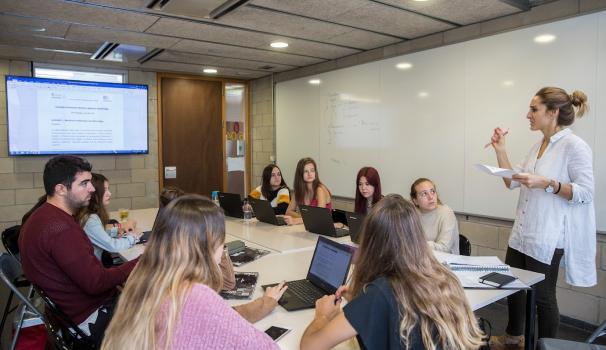
Seminars held in reduced groups for tailored learning
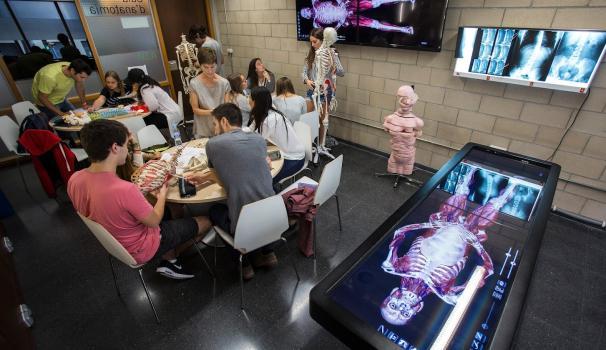
Innovative teaching methodology
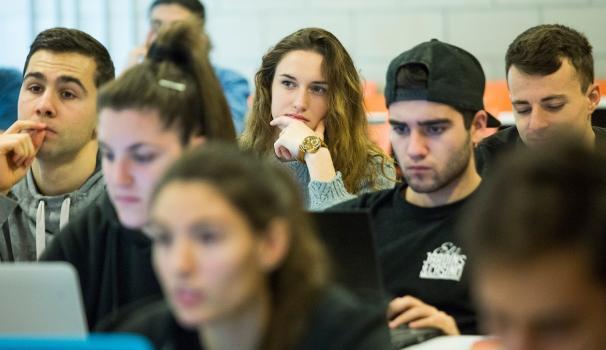
Studies taken abroad to give students an enriching experience
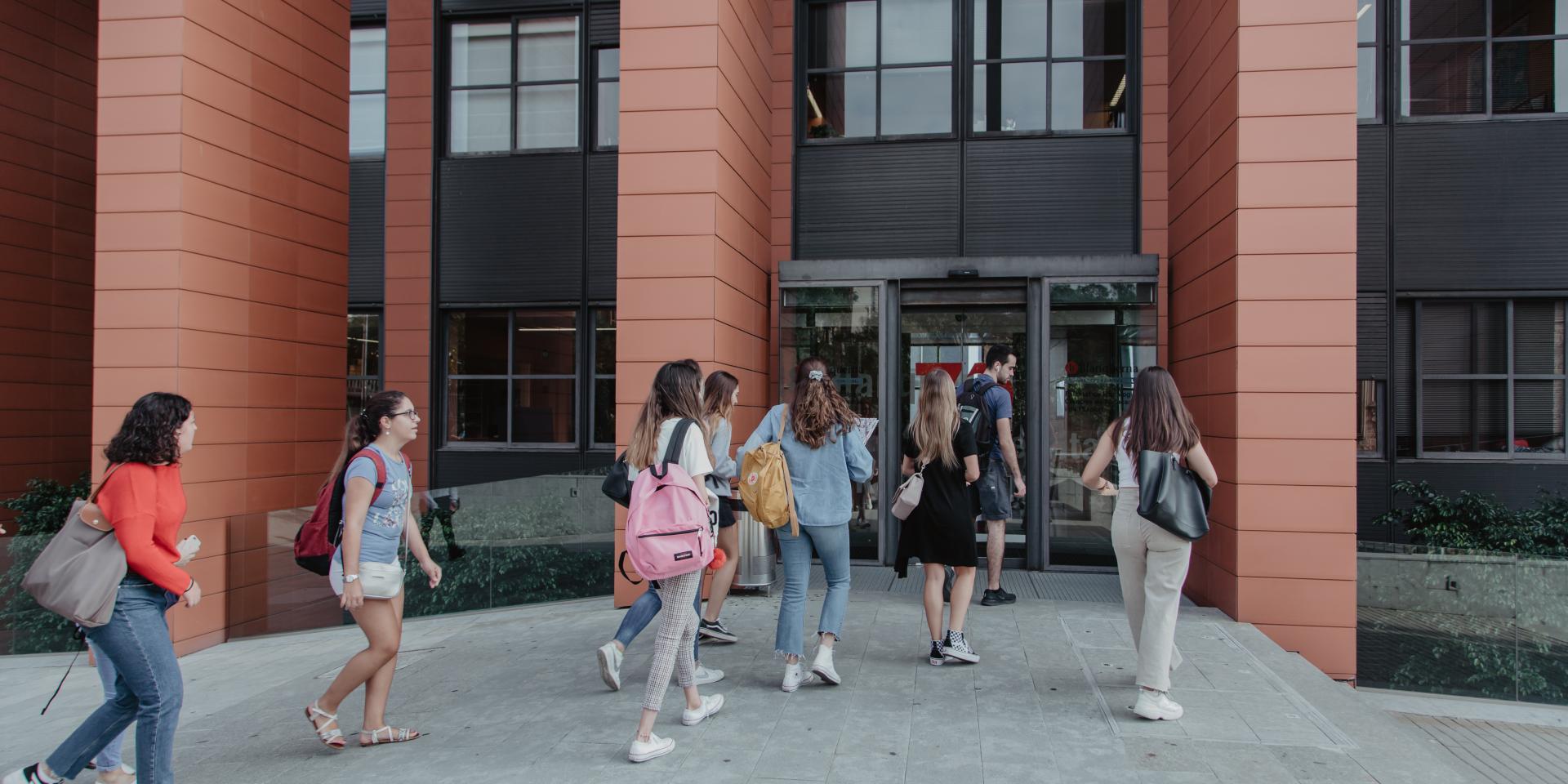
Study for a double major
Study for two majors simultaneously, consecutively or following a track tailored to you
News
July 28, 2023
Have you watched the video of the graduation of master's and graduate studies students?
July 7, 2023
Congratulations to all of our master's and postgraduate graduates from the School of Health Sciences!
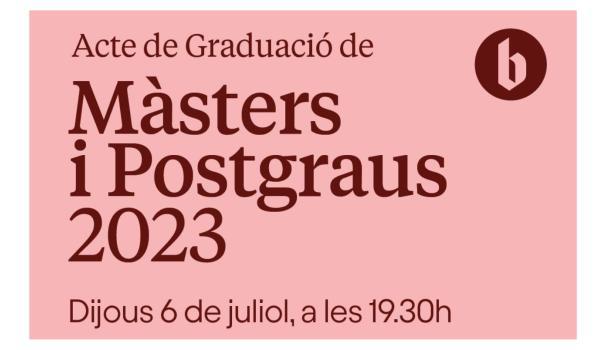
July 5, 2023
Dr. Arturo Goicoechea, godfather of the Graduation Ceremony of master's and postgraduate degrees of the School of Health Sciences
Academic information
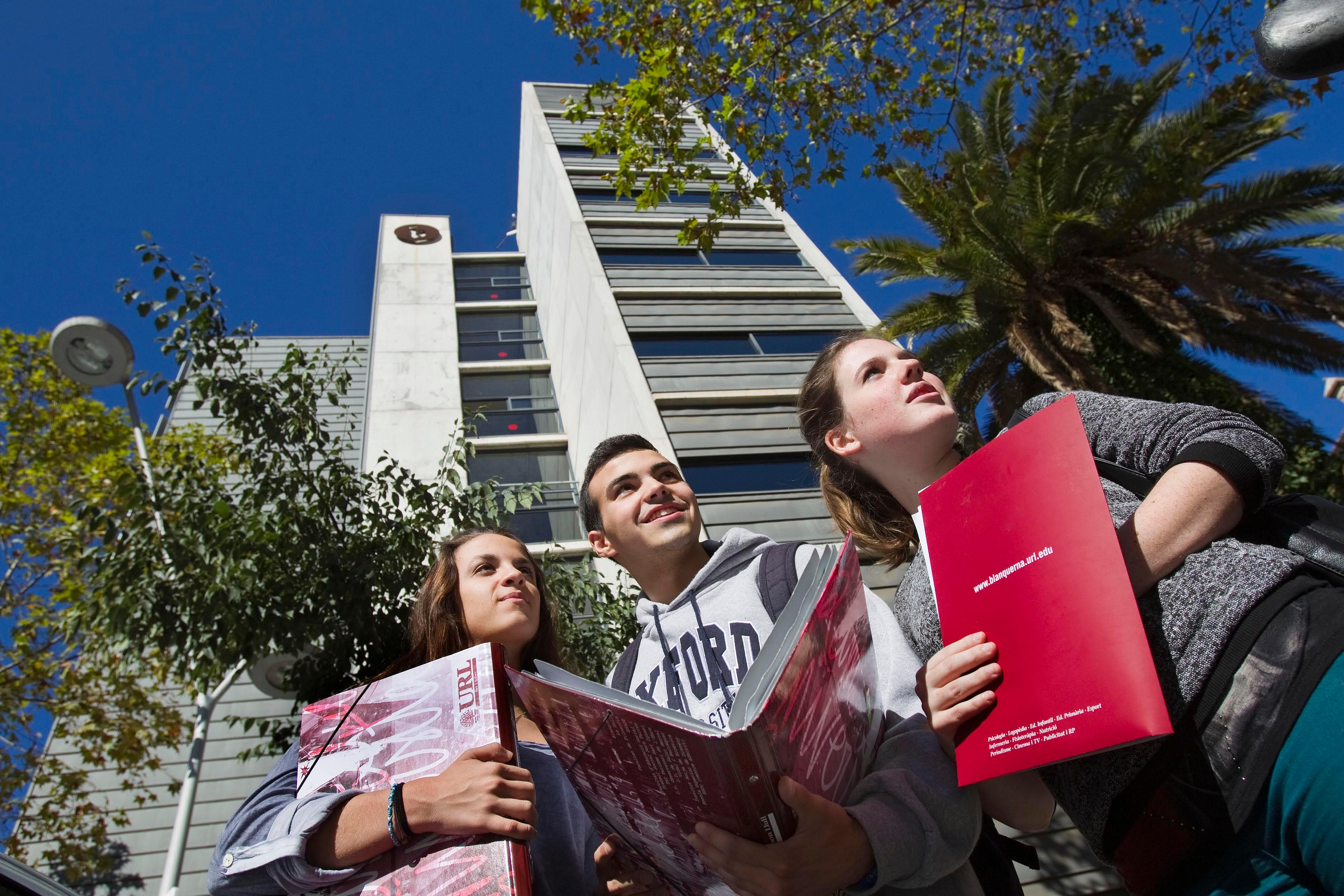
Curriculum
The curriculum is designed with a curricular itinerary that ensures up-to-date, generalist and quality basic training.
Credits
| First | Second | Third | Fourth | Total | |||
| Practicum | 8 | 16 | 24 | ||||
| Final degree project | 6 | 6 | |||||
| Core curriculum | 42 | 18 | 60 | ||||
| Compulsory | 18 | 42 | 52 | 29 | 141 | ||
| Optional | 9 | 9 | |||||
| Total | 60 | 60 | 60 | 60 | 240 |
| Subject | |||
| First semester | |||
| Anatomy and Physiology 1 | 6 | Core curriculum | |
| Applied Food Chemistry | 6 | Core curriculum | |
| Biology | 6 | Core curriculum | |
| Food Science 1 | 6 | Compulsory | |
| Laboratory | 3 | Compulsory | |
| Second semester | |||
| Anatomy and Physiology 2 | 6 | Core curriculum | |
| Biochemistry | 6 | Core curriculum | |
| Anthropology | 6 | Core curriculum | |
| Food Science 2 | 4 | Compulsory | |
| Physiology of Nutrition | 5 | Compulsory | |
| Annual | |||
| Seminar in Health Sciences | 6 | Core curriculum |
| Subject | |||
| Third semester | |||
| Sociology and Sustainability | 6 | Core curriculum | |
| Psychology and Therapeutic Communication | 6 | Core curriculum | |
| Food Innovation and Technology | 5 | Compulsory | |
| Dietary Techniques and Strategies | 5 | Compulsory | |
| Molecular Nutrition and Genetics | 5 | Compulsory | |
| Professional Seminar 1 | 3 | Compulsory | |
| Fourth semester | |||
| Biostatistics | 6 | Core curriculum | |
| Culinary Technology | 6 | Compulsory | |
| Microbiology and Toxicology | 6 | Compulsory | |
| Dietetics | 8 | Compulsory | |
| Research Methodology | 4 | Compulsory |
| Subject | |||
| Fifth semester | |||
| Food Hygiene, Safety and Legislation | 5 | Compulsory | |
| Nutritional Assessment | 4 | Compulsory | |
| Pathophysiology and Diet Therapy 1 | 9 | Compulsory | |
| Basic Pharmacology | 3 | Compulsory | |
| Public Health and Nutritional Epidemiology | 6 | Compulsory | |
| Professional Seminar 2 | 3 | Compulsory | |
| Sixth semester | |||
| Food service and Food Quality | 4 | Compulsory | |
| Pathophysiology and Diet Therapy 2 | 6 | Compulsory | |
| Artificial and Hospital Nutrition | 3 | Compulsory | |
| Advanced Pharmacology | 3 | Compulsory | |
| Community Nutrition | 6 | Compulsory | |
| Placement 1 | 8 | Practicum |
| Subject | |||
| Seventh semester | |||
| Economics and Management-Legislation | 5 | Compulsory | |
| Pathophysiology and Diet Therapy 3 | 4 | Compulsory | |
| Communication Strategies | 3 | Compulsory | |
| Bioethics | 4 | Compulsory | |
| Nutrition education Strategies | 6 | Compulsory | |
| Placement 2 | 8 | Practicum | |
| Eighth semester | |||
| Marketing and Regulation | 4 | Compulsory | |
| Professional Seminar 3 | 3 | Compulsory | |
| You must choose 3 electives from the List: | |||
| Abordaje de la alimentación en los Trastornos de la Conducta alimentaria | 3 | Optional | |
| Alimentación y envejecimiento saludable | 3 | ||
| Consejo alimentario en situaciones de vulnerabilidad socioeconómica y culturas alimentarias diversas | 3 | ||
| Chronobiology and chrononutrition | 3 | ||
| Dietoterapia en pediatría | 3 | ||
| Diseño de programas y actividades de educación alimentaria | 3 | ||
| Nutrition & Immunity | 3 | ||
| Microbioma: probióticos y prebióticos | 3 | ||
| Sports nutrition | 3 | ||
| Sustainable food systemss | 3 | ||
| Placement 3 | 8 | Practicum | |
| Final Degree Project | 6 | Final degree project |
Credits
| First | Second | Third | Fourth | Total | |||
| Final degree project | 10 | 10 | |||||
| Core curriculum | 40 | 24 | 64 | ||||
| Internships | 7 | 17 | 24 | ||||
| Compulsory | 20 | 36 | 53 | 27 | 136 | ||
| Optional | 6 | 6 | |||||
| Total | 60 | 60 | 60 | 60 | 240 |
| Subject | Credits | Academic type | |
| First semester | |||
| Anatomy-physiology 1 | 6 | Core curriculum | |
| Biology | 6 | Core curriculum | |
| Food science 1 | 5 | Compulsory | |
| ENG/Investigación y gestión de datos | 6 | Core curriculum | |
| Chemistry | 4 | Compulsory | |
| Second semester | |||
| Anatomy-physiology 2 | 6 | Core curriculum | |
| Anthropology | 6 | Core curriculum | |
| Food science 2 | 5 | Compulsory | |
| Physiology applied to nutrition | 6 | Core curriculum | |
| Sociology | 4 | Core curriculum | |
| Annual | |||
| Interdisciplinary seminar | 6 | Compulsory | |
| Subject | Credits | Academic type | |
| Third semester | |||
| Communication | 6 | Core curriculum | |
| Dietetics 1 | 4 | Compulsory | |
| English 1 | 6 | Core curriculum | |
| Microbiology-toxicology | 4 | Compulsory | |
| Psychology | 6 | Core curriculum | |
| Professionalising seminar 1 | 4 | Compulsory | |
| Fourth semester | |||
| Dietetics 2 | 8 | Compulsory | |
| Statistics | 6 | Core curriculum | |
| Physiopathology | 6 | Compulsory | |
| Food safety | 4 | Compulsory | |
| Culinary technology | 6 | Compulsory | |
| Subject | Credits | Academic type | |
| Fifth semester | |||
| Bioethics | 4 | Compulsory | |
| Diet Therapy 1 | 6 | Compulsory | |
| Pharmacology | 6 | Compulsory | |
| Food service management | 4 | Compulsory | |
| Public healthcare | 6 | Compulsory | |
| Professionalising seminar 2 | 4 | Compulsory | |
| Sixth semester | |||
| Diet therapy 2 | 4 | Compulsory | |
| English in health sciences | 6 | Compulsory | |
| Community nutrition | 6 | Compulsory | |
| Food preparation in diet therapy | 4 | Compulsory | |
| Nutritional evaluation | 3 | Compulsory | |
| External practice 1 | 7 | Practicum | |
| Subject | Credits | Academic type | |
| Seventh semester | |||
| Economy and management-legislation | 6 | Compulsory | |
| Nutritional education | 6 | Compulsory | |
| Diet therapy 3 | 4 | Compulsory | |
| Marketing-regulation | 4 | Compulsory | |
| Professionalising seminar 3 | 4 | Compulsory | |
| Eighth semester | |||
| Option 1. Choose from one the following 2 options: | 3 | Optional | |
| Nutrition and immunity | |||
| Nutrition and physical activity | |||
| Option 2. Choose from one the following 2 options: | 3 | Optional | |
| Microbiome, probiotics and prebiotics | |||
| Nutrigenetics and nutrigenomics | |||
| Food science and food law | 3 | Compulsory | |
| End-of-course project | 10 | Final degree project | |
| Annual | |||
| External practice 2 | 17 | Practicum | |
| ENG/ Al finalizar el grado el estudiante habrá tenido que cursar 6 créditos de Optativas | |||
We make it easy, so you can choose whatever you want to study
Course fees are paid in installments without any interest. At the time of enrollment, 50% of the total cost of the credits for which the student is enrolled must be paid*; the remaining 50% is split into nine monthly installments (from October to June) payable by direct debit.
The tuition fee / credit of degrees is regularized each academic year for all courses.
Tuition fee for the 2026–27 academic year
Discounts for bachelor's degrees from Blanquerna-Ramon Llull University
Fundació Blanquerna discounts (not cumulative with each other):
- Student member of a large or single-parent family: 5% discount.
- Student with disability >33%: 5% discount.
- Blanquerna family (student, child, sibling or partner, student): 5% discount. Anyone who has completed an official degree will be considered an Alumni.
In order to apply the discount, you must prove it with the corresponding document. Students must bring the original document in person to the Academic Secretariat, together with their identification document, for validation and application of the corresponding discount.
The deadline for submitting the supporting documentation for the 2026-2027 academic year is September 30, 2026.
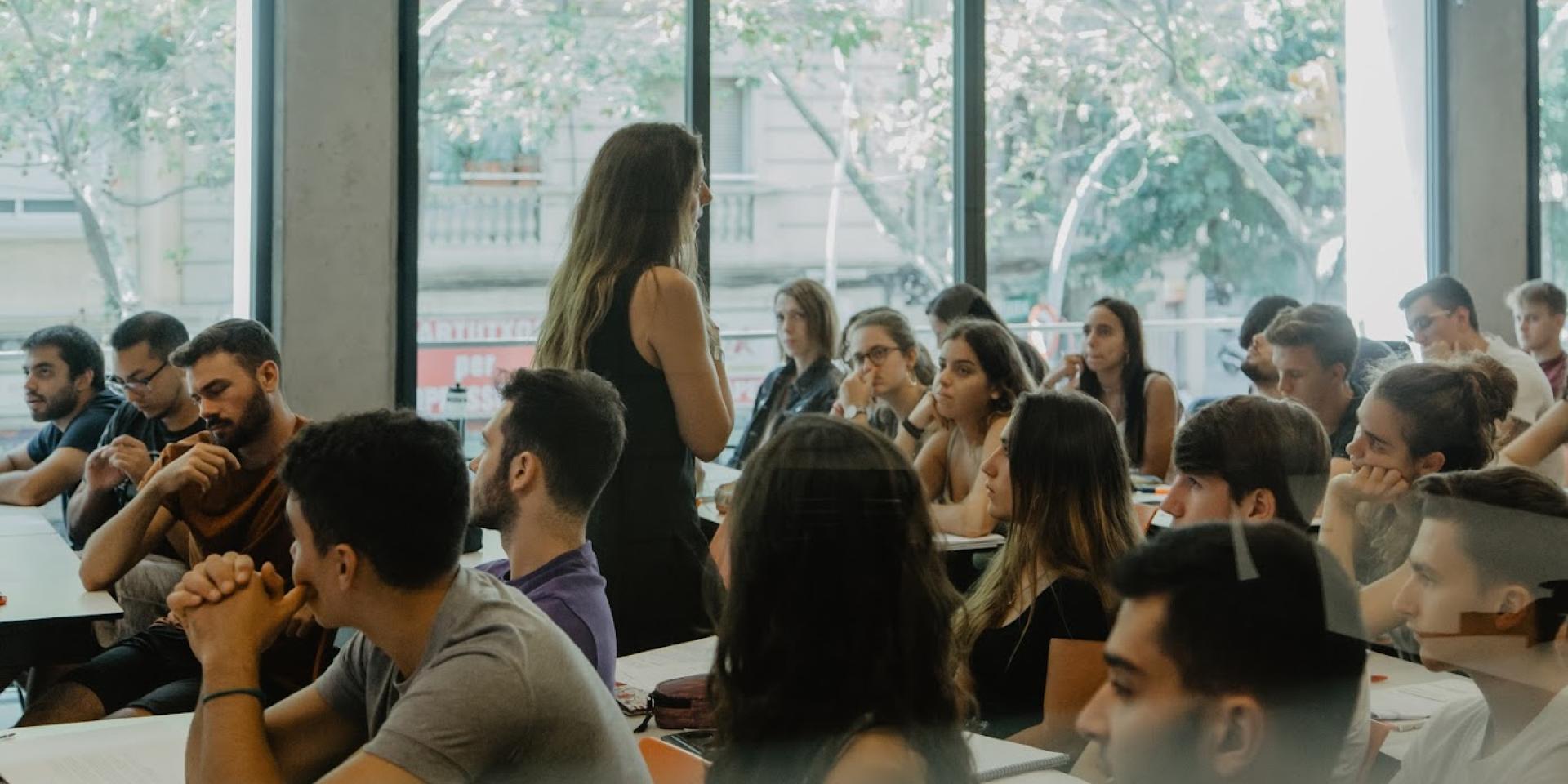
Gain the qualification to practice the regulated profession
The bachelor's degree in Human Nutrition and Dietetics qualifies graduates to work in the area of health and enables them to practice the profession in planning, counseling, teaching, research or management. The dietician-nutritionist can undertake their duties independently, through freely exercising the profession, or in public or private institutions.
Human nutrition and dietetics has a broad range of professional possibilities in a society that is increasingly sensitive to the individual and collective eating habits of various sectors of the population.

Clinical nutrition
Working on the nutrition of the healthy or sick person, considering their physiological or pathological needs, the socioeconomic situation and personal, religious or cultural preferences.
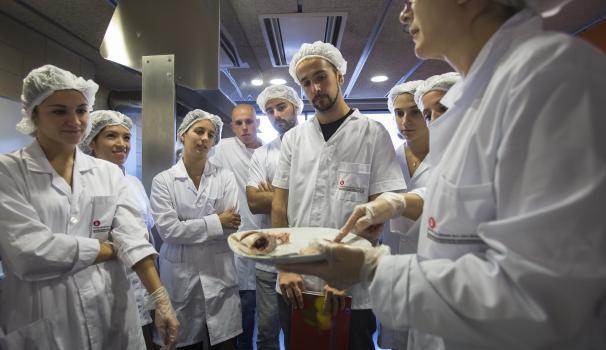
Community or public health nutrition
Working for people by developing and participating in food policy, prevention and health programs in general, and food education.
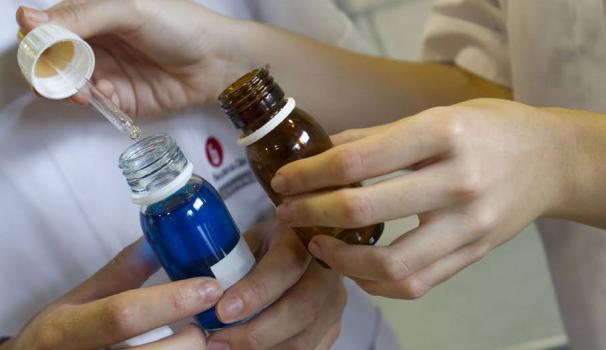
Food industry
Acting as a consultant in the innovation and design of new products and in food-related social marketing.

Mass catering
Participating in the management and organization, and ensuring the quality and safety of food throughout the production process. Training food-service staff in food safety, planning menus and assessing the nutritional balance of the food supply.

Education-teaching
Giving training at public and private centers where knowledge about nutrition, food, dietetics and health is taught.
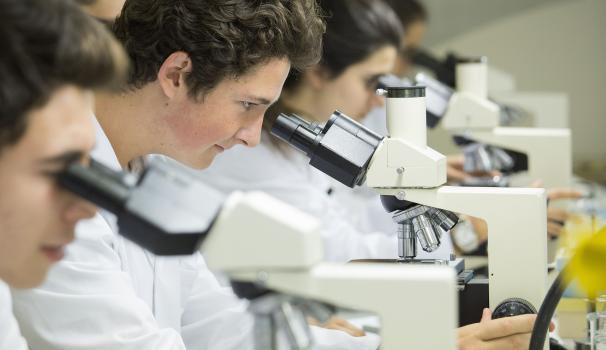
Research
Being part of a multidisciplinary research and development team in the area of food, nutrition and health.
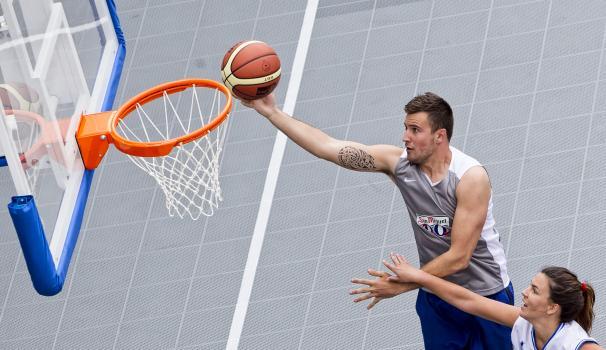
Sports nutrition
Provides nutritional advice to athletes with the aim of achieving high athletic performance and minimising injuries, as well as collaborating in the development of new sports supplements.

A direct link to your future career
Our work doesn't finish the moment you graduate. The Alumni department will support you to enable us to achieve an employment rate of 90% of students in the first year after graduation
State-of-the-art equipment at the student's disposal
Cooking laboratory
Is there anything better than a kitchen lab to put all your knowledge of nutrition and dietetics into practice? In this classroom you will be able to discover all the techniques of dietetics and diet therapy.
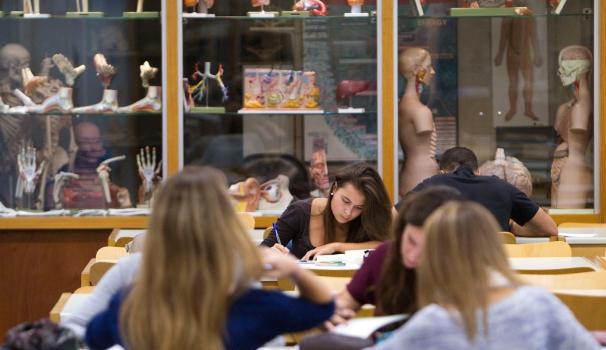
Anatomy room. Osteoteca
This room has teaching resources so that students can become familiar with the human body, identify and locate muscles, bones, arteries, veins or nerves.
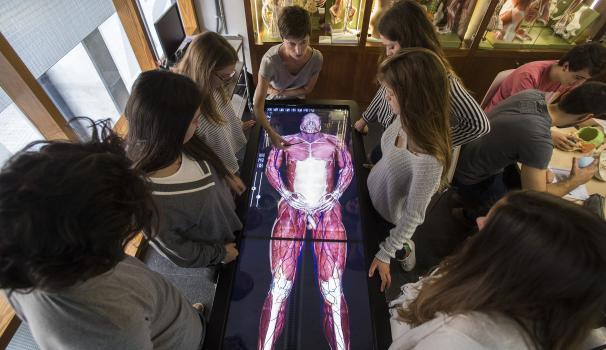
Anatomy
See human anatomy in its entirety on a real scale and in 3D. This is the reality that allows the anatomy, an interactive display table to see any anatomical system of the human body.
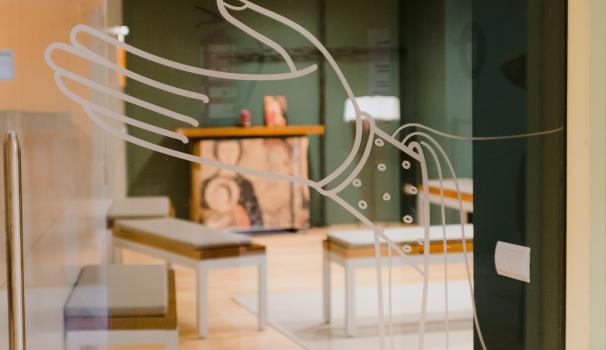
Chapel
The chapel is the right place to find recollection, peace, to focus, to pray and to celebrate the Eucharist weekly and at important liturgical moments (Christmas, Ash Wednesday and Easter). The sacrament of reconciliation is also celebrated.
Libraries
If you need a quiet space to study or to do individual and group work, come to the library! Each school has its own library with computers, workrooms, reading points and an extensive catalog of documents you can consult in both hard copy and digital format.
All the services you need during your course
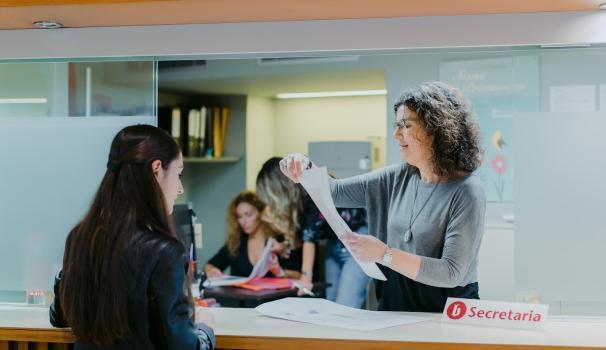
Academic Secretary
The Academic Secretaries of the Blanquerna faculties are the space for students to relate to the processes linked to the registration of official and own courses.
Internship service
Professional experience is a core part of our methodology. For this reason, we have a broad spectrum of internship agreements to meet the needs and preferences of all students. You will graduate having worked in your industry.

Scholarships and grants service
At Blanquerna, we put the future within everyone's reach thanks to our scholarships and grant service to start or continue studying at our schools. Financial aid is both internal and external to the university. You will find a wide range of possibilities.

International Mobility Office
Going abroad is a unique opportunity to discover the plurality of the world. Aware of the importance of the internationalization of studies, we have established mobility agreements around the world.
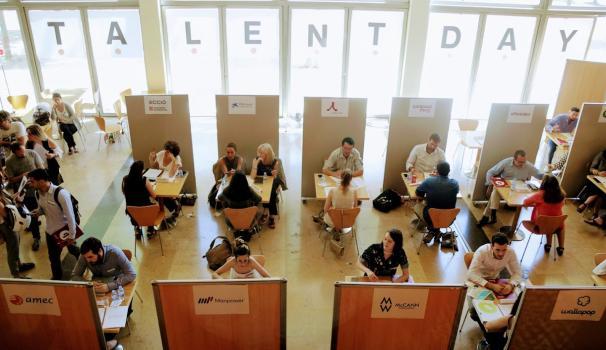
Careers
This service provides graduates with the necessary means so that they can actively participate in their professionalism and propose optimal candidates to organizations and companies looking for staff.

Job Bank
The leap into the world of work is always a challenge. For this reason, we provide a Job Bank for students and graduates. This service puts students in touch with companies and institutions looking for staff.
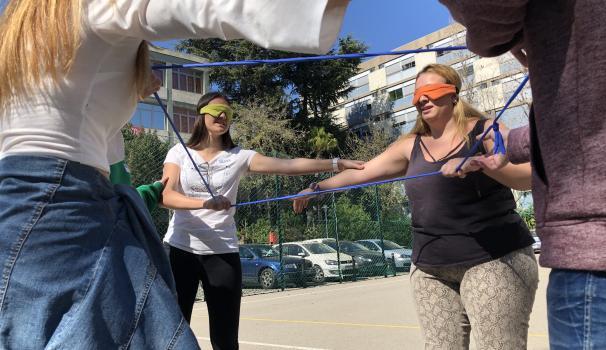
Solidarity action
Solidarity and the struggle for human dignity are values that identify us. Solidarity Action is a volunteer program that our students can join to participate in projects in the Third and Fourth World.

Alumni service
Studying in Blanquerna allows you to be part of our community. Being a college student opens the door to a lot of options for continuing your vocational training beyond your time in the classroom.

Sports service
Want to represent the URL in college sports tournaments? You can find a wide range of possibilities for both individual and team sports. To be a student of Blanquerna, you will have a discount at the Can Caralleu and La Salle Sport & Fitness sports complexes.

Personal Guidance Service (SOP)
If you are in a difficult situation in the academic, personal or social field, you can request, free of charge, the personalized attention of the SOP. This is an interdisciplinary team of professionals who will guide you in dealing with the situation.
Faith and Spirituality
In the three Blanquerna faculties, you will find spaces for reflection isolated from the hustle and bustle dedicated to the celebration of the Faith or cultural and religious animation. If you wish, you can also receive personalized attention and information about church life.
Diversity support
At Blanquerna we promote personal development at all levels to people with a diversity of specific needs from a normalizing context that encourages personal autonomy and uniqueness.
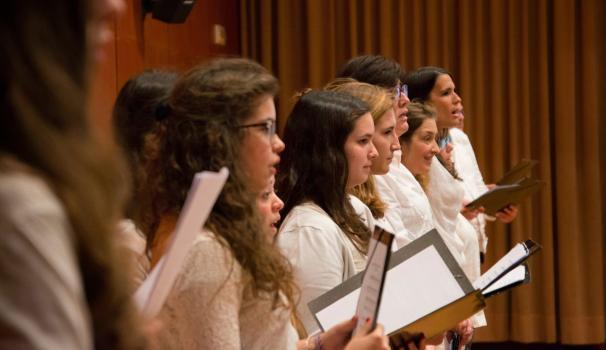
Blanquerna Choir
If you like music and want to take part in the concerts of institutional events and festivities, sign up for the Blanquerna Choir. There you will meet new friends and enjoy music.
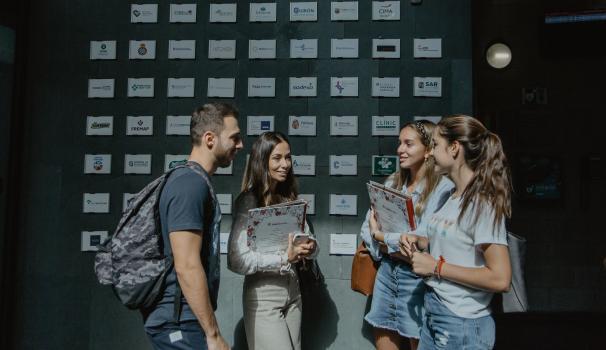
Student representatives
Each class group must elect a representative to put forward concerns or make proposals to the faculty members and academic management. At the same time, each degree must appoint a delegate and each school a representative on the general URL council.
Student Council
Contact between students and the university is constant and is channeled through the Student Council, the body that collects proposals and requests from students and facilitates university life.

Language support service
Are you studying a foreign language and want to improve your level? Do it at your own pace in the language self-learning classroom. This service offers various teaching resources and materials to practice the language.
Director
Elena Carrillo Alvarez
Coordinators
Begoña Angélica Caneda Ferrón
Eva Espona Malet
Faculty
Marta Maria Anguera Salvatella
Andrea Arroyo Fernandez
Xavier Cardona Iguacen
Noemi Cuenca Quesada
Marina Diana Perez
Eloisa Carmen Entrala Torres
Anna Maria Gelonch Nicolau
GaryG Gibson
Antonia María Gómez Hinojosa
Glòria Gómez López
Julian González García
Mar Guilarte Clavero
Alvaro Hernáez Camba
Jordi Jaime Ibañez Nolla
Paula Gabriela Jakszyn Filosof
Giuliana Raffaella Longworth
Concepción Mestres Miralles
Raimon Milà Villarroel
Rafael Montilla Arévalo
Júlia Muñoz Martinez
Alicia Orta Ramirez
Andreu Prados Bo
Yael Puyol Martín
Blanca Roman Viñas
Pedro Sainz Garcia
Jordi Sànchez Torrents
Elisabet Saravia Terricabras
Mireia Solà Madurell
Cristina Soldevilla Barbosa
Eulàlia Vidal Garcia
Maria Dolores Zomeño Fajardo
Professorat Col·laborador/Convidat
Ramon Maria Soldevila de Monteys
Application for admission
The application process for a place in the 2026-2027 academic year is now open and consists of three phases:
- Application for admission
- Admission
- Enrollment
1. Application for admission
The application for a place can be made online or in person and entitles the applicant to participate in the admission process.
It can be done via the Application for admission button on the page for each degree, or directly from here, and requires:
- Registering in the single registration system and creating a user account (if not done previously).
- Making a payment of €50 (non-refundable) for admission rights and procedures. This can be done with a credit or debit card through a secure and confidential process with BBVA bank.
- Uploading the documentation to the document repository before the deadline for the place application process.
- Identification document (DNI, NIE, Passport)
- Certification of university entrance qualifications (PAU (University Entrance Exams), CFGS (Higher-Level Vocational Training), International Baccalaureate Diploma, etc.) if available at the time of applying for a place.
It can be done at the School itself, by going to the Student Information and Guidance Service (SIOE), and the following must be submitted:
- Photocopy of the identification document (DNI, NIE, Passport)
- Photocopy of the certification of university entrance qualifications (PAU (University Entrance Exams), CFGS, International Baccalaureate Diploma, etc.) if available at the time of applying for a place.
- Payment of €50 (non-refundable) for admission rights and procedures. This can be made in cash or with a credit or debit card.
IMPORTANT - BACHELOR'S DEGREE IN NURSING: Students from High School (Batxillerat):
If, at the time of submitting the application for a place in the degree in Nursing, as well as for simultaneous studies (e. g., Nursing and Nutrition), the final High School and PAU (University Entrance Exams) grades are already available and are equal to or higher than 6, the applicant will be called to enroll once admitted.
If the final entrance grades for High School and PAU (University Entrance Exams) are not available, an official certificate from the educational center must be attached, containing the average grade for the first year or the final High School grade. Once this certificate is submitted, there are two options:
Option 1. If the grade is equal to or higher than 6, the student will be called to make a conditional enrollment and may choose a shift while places are available.
Option 2. If the grade is lower than 6, the student may participate in the June place allocation, which will be based on the submitted grade as the first criterion and the date of payment of the place application as the second criterion. From the date on which the final grade of the university entrance exams becomes available, if there are still places available, only students who have submitted the certificate with their final admission grade will take part in the allocation process.
Note: In the case of students from international high schools, an official document from the school of origin must be submitted with the final average grade for the course and its equivalence to the Spanish system.
IMPORTANT - BACHELOR'S DEGREE IN NURSING: Students from Higher-Level Vocational Training (CFGS) or Recognised Baccalaureate:
If, at the time of submitting the application for a place in the degree in Nursing, as well as for simultaneous studies (e. g., Nursing and Nutrition), the final CFGS grade is already available and is equal to or higher than 7, the applicant will be called to enroll once admitted.
If the entrance grade (neither provisional nor final) for CFGS or Recognised Baccalaureate is not available, applications for a place in the aforementioned studies can be formalized, and the student will participate in the June place allocation, which will be based on the final grade submitted via an official certificate from the educational center containing the final average grade of the qualification. The grade mentioned will be considered as the first criterion, and the date of payment of the place application as the second criterion. For the Bachelor's Degree in Nursing, 30% of places will be reserved for students from this pathway.
IMPORTANT – DEGREE IN NURSING: Students coming from previously started university studies:
If, at the time of applying for a place in the Nursing degree program, as well as for any double degree (e.g., Nursing and Nutrition), the applicant has already begun university studies, they must contact the Faculty’s Student Information and Guidance Service.
2. Admission
Approximately within two working days after the place application, the student will be informed by email about their admission. If admitted, the same message will invite them to formalize enrollment, including instructions on when and how to complete the procedure.
The criterion used to call admitted students to formalize enrollment will be the order of payment of the place application. For degrees with more than one shift, note that a shift may fill up during the enrollment period. The place will be definitive once the student has submitted the documentation with the final university entrance information and the first enrollment payment has been made.
For degrees taught in English, students must demonstrate a minimum B2 level of English to be admitted. The level can be accredited through the level test that all degree students must take before starting their program. To prove the minimum level, an official language certificate of B2 or higher can also be submitted: IELTS (6-7), TOEFL (IBT 90-110), CAMBRIDGE, or Official Language Schools, obtained within the last two years. Certificates from other organizations will not be accepted. The certificate does not exempt students from taking the level test to determine the English level for the first year.
It is the student's responsibility to have a level equivalent to B2 in the language of instruction of the degree to properly follow classes
3. Enrollment
The student called to enroll may choose between two options, depending on whether they already have the definitive entrance pathway or not.
- Conditional Enrollment
Enrollment in the degree can be formalized before passing the PAU (University Entrance Exams) or CFGS or having the entrance pathway. Enrollment will be conditional on the presentation of the corresponding admission pathway. This option secures the place and allows choosing the shift, in the case of degrees with more than one shift, while places are available.
If the student does not obtain the entrance pathway, the enrollment fee will be refunded, but they will lose the place, preference in shift selection, and the amount paid for the place application (€50). If places remain available in July, they may choose to stay on the waiting list until September, and the money will be held, but they will no longer have preference for shift selection. If they do not obtain the entrance pathway by September, the enrollment fee paid will be refunded.
- Final enrollment
It will be formalized if, at the time of processing the enrollment, the student already has the university entrance pathway. They may opt for the available places and shifts.
IMPORTANT: Degrees with more than one shift may exhaust places in a specific schedule with conditional enrollment. The required documentation must be uploaded via the Document Repository.
The place will be definitive once the student has submitted the documentation with the final university entrance information and the first enrollment payment has been made.
Studies can be paid upfront and/or in interest-free installments. If payment by installment is selected, upon enrollment the student will have two business days to pay 50% of the total cost of the enrolled credits, using their chosen form of payment; this payment will not be taken by direct debit. The remaining 50% will be divided into nine monthly payments from October to June via bank direct debit from the account provided at the time of enrollment. Prices for each academic year are updated annually.
Once payment is made, the corresponding receipt of enrollment can be viewed in the student's Document Repository and via the student's portal.
INTERNATIONAL OR FOREIGN STUDENTS
For the foreign student admission process, the following considerations and requirements must be taken into account in accordance with the prevailing regulations.
Students must apply to the Universidad Nacional de Educación a Distancia (UNED) to obtain the credential certifying that they meet the requirements to access university studies within the state education system (UNED Credential). Therefore, they do not need to take the PAU (University Entrance Exams), but without the mentioned credential, they cannot enroll in our degrees.
The education systems that can be accessed through this pathway are: Germany, Andorra, Austria, European Schools (European baccalaureate), International Baccalaureate, Belgium, Bulgaria, Croatia, Denmark, Slovakia, Slovenia, Estonia, Finland, France, Greece, Hungary, Ireland, Iceland, Italy, Latvia, Liechtenstein, Lithuania, Luxembourg, Malta, Norway, the Netherlands, Poland, Portugal, the United Kingdom, the Czech Republic, Romania, Sweden, Switzerland, China and Cyprus.
These students may access our degrees by submitting the homologation of the High School diploma from the Spanish Ministry of Education or from the autonomous communities with transferred competence, such as the Generalitat de Catalunya. Proof of application for convalidation will be sufficient for students to enroll and begin taking a bachelor's degree course, however full enrollment is conditional on convalidation being confirmed. Bear in mind that convalidating studies can take more than three months to complete, so this process should be done in parallel with the admissions process to our bachelor's degrees. If the convalidation resolution is not obtained in the terms requested by the interested party, the results of any exams taken, or the enrollment made as a result thereof, are rendered null and void.
Contact
For any questions or inquiries about the place application or enrollment process, contact [email protected]
The bachelor's degree thesis, the step prior to the labor market
The bachelor's degree thesis is a project that marks the end of the bachelor studies stage. It must be a complete and relevant work, enabling students to integrate the competences, knowledge and skills acquired during their bachelor's degree learning and must be applicable to the professional sphere in any of its aspects.
Check the regulations at the following link.
It is an individual, tutored project, with defense, assessment and grading according to established regulations, in which the student is responsible for their own learning process.
The thesis will consist of the completion and presentation by the student of an unpublished work that is included in one of the areas of knowledge proposed by each degree program. The possible types of thesis project are:
- Research project protocol (quantitative and/or qualitative)
- Systematic review protocol
- Education for health program
The follow-up of the thesis is structured on the basis of the formation of groups of 12 students (approximately) accompanied by 2 tutors, who will work in one of the established areas of knowledge. There are four group sessions and the rest of the follow-up is individualized.
The final grade of the thesis will be the weighted average of three grades:
30% follow-up, 40% written work, 30% defense.

We help you pay for your studies. A future within everyone's reach.
Find the help that best suits your needs between Blanquerna scholarships and grants, public and private grants or funding grants.
Blanquerna-URL is waiting for you!
Scholarships and grants Blanquerna
Public aid
funding
Internships, an experience to introduce you to the labor market
Internships are an essential part of our methodology. We deem it a first step towards the working world that brings students closer to the reality of the sector and gives them a professional outlook. Therefore, we have agreements with a broad variety of companies, organizations, centers and entities in order to meet the needs and preferences of each student.
- Internships in the field of mass catering.
- Internships in the field of community nutrition.
- Internships in the field of clinical nutrition.
- Immersing students in the career reality and acquiring the skills described in the training programs, in order to facilitate their integration into the world of work and develop their entrepreneurial skills.
- Integrating the theoretical knowledge acquired.
- Developing and working on the skills specific to the dietician-nutritionist profession.
- Getting to know various areas of work and contacting potential future employers.
Where can you do your internship?
Catalan Public Health Agency · Arcasa - Hospital de la Santa Creu i Sant Pau · Arcasa - Hospital de Mataró · Arcasa - Hospital Duran i Reynals · Arcasa - Hospital Universitari Germans Trias i Pujol · Associació de Diabètics de Catalunya · Catering Arcasa, S.L. · Cesnut Nutricion, S.L. · CLECE, S.A.- Hospital Universitari de Bellvitge · Clínica Diagonal, S.L. · Consell Català de l'Esport · Corporació Sanitària Parc Taulí de Sabadell · Consorci Mar Parc de Salut de Barcelona. Hospital del Mar · Consorci Sanitari del Maresme - Hospital de Mataró · Creu Roja Catalunya · Fárfara Lab · Fundació Alícia · Fundació Catalana de l'Esplai · Fundació Dieta Mediterrània · Fundació Futur · Fundació Hospital Asil de Granollers · Fundació Privada Hospital de Mollet · Fundació Institut Mar d'Investigacions Mèdiques (Fundació IMIM) · Fundació per a la Investigació Nutricional - FIN · Fundació Privada Servidigest · GAN Nutrición y Gastronomía, S.L. · Hospital de Nens de Barcelona · Hospital de Sant Joan de Déu · Hospital de Sant Joan Despí Moisès Broggi · Hospital Municipal de Badalona, S.A. · Hospital Universitari de Bellvitge · Hospital Universitari de Girona Doctor Josep Trueta · Hospital Universitari Dexeus · Hospital Universitari Germans Trias i Pujol · Hospital Universitari Vall d'Hebron · Instant Proces, S.L. · Institut Català d'Oncologia. Hospital Duran i Reynals (ICO) · Hospital Universitari Mútua de Terrassa · ONG Nutrició Sense Fronteres · Parc Sanitari Sant Joan de Déu · Saia Formació, S.L. · SARquavitae Servicios a la Dependencia, S.L. · Sodexo - Hospital de l'Esperança · STICSA, S.L.
Degree accredited by AQU (Quality Assurance Agency)
Report
Information from the Registry of Universities, Centers and Degrees (RUCT)
Reports by the Agency for the Quality of the University System of Catalonia (AQU Catalunya)
Gender perspective
As the European Union points out, gender equality is not only a matter of social justice but also affects the results of teaching and research. Promoting gender equality in research and innovation is one of the European Commission's commitments, and it supports the explicit integration of a gender perspective in Horizon 2020 projects. However, this recommendation is often poorly understood and misapplied. Various documents are presented here with a view to contributing to a better understanding and application of the gender perspective in teaching and research.
RELATED PROGRAMS
